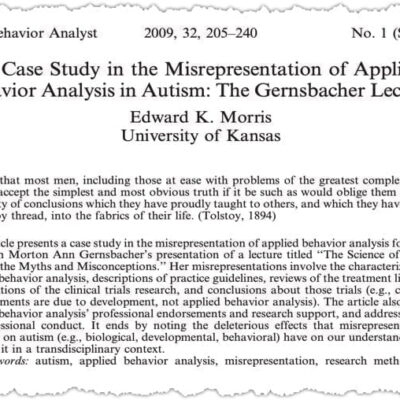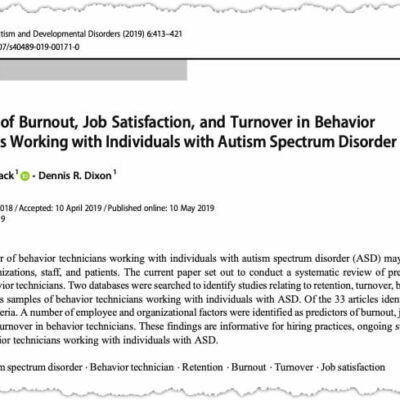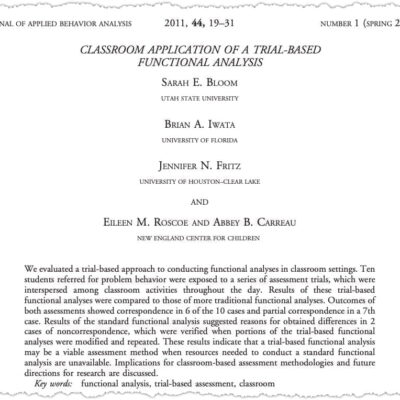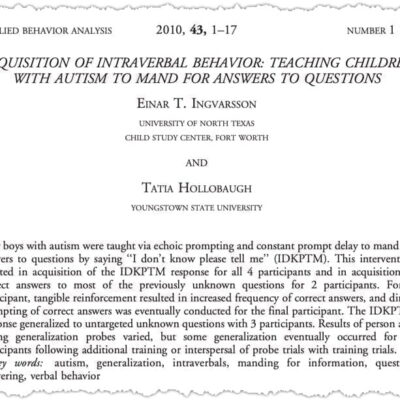Maintaining Professional Relationships in an Interdisciplinary Setting: Strategies for Navigating Nonbehavioral Treatment Recommendations for Individuals with Autism
$4.99
BCBA CEUs: 0.5 Total CEU | 0.5 Ethics CEU
Read the following article and pass a 5-question quiz on it:
Brodhead, M. T. (2015). Maintaining professional relationships in an interdisciplinary setting: Strategies for navigating nonbehavioral treatment recommendations for individuals with autism. Behavior Analysis in Practice, 8, 70-78.
Brand: CEUniverse
Description
To earn credit, you will be required to read the article and pass a 5-question quiz about it. You can retake the quiz as many times as needed, but you will not receive exactly the same questions each time.
Abstract
Due to an increase in research and clinical application of behavior analysis with individuals with autism spectrum disorder (ASD), one setting a Board Certified Behavior Analyst (BCBA) may work within is an interdisciplinary setting, where multiple disciplines collaborate to improve the outcomes of individuals with ASD. In some cases, nonbehavioral colleagues could recommend nonbehavioral treatments, setting the occasion for the BCBA to offer an alternative treatment to or question the nonbehavioral treatment. However, excessive questioning or critiques of nonbehavioral treatments by the BCBA may unintentionally erode professional relationships between the BCBA and their nonbehavioral colleagues. Because an erosion of professional relationships may occur when a BCBA questions a nonbehavioral treatment, a decision-making model for determining whether or not the proposed nonbehavioral treatment is worth addressing may be useful. The purpose of this paper is to outline such a decision-making model in order to assist the BCBA in assessing nonbehavioral treatments while maintaining an ethical balance between professional relationships and the well being and safety of the individual with ASD. Such a model could assist the BCBA in becoming familiar with the proposed treatment, understanding the perspective of the nonbehavioral colleague and assessing the negative impacts the treatment could have on the individual with ASD. With this information, the BCBA will be in a better position to decide whether or not addressing the nonbehavioral treatment is worth the possibility of eroding a professional relationship.
4 reviews for Maintaining Professional Relationships in an Interdisciplinary Setting: Strategies for Navigating Nonbehavioral Treatment Recommendations for Individuals with Autism
| 5 star | 100 | 100% |
| 4 star | 0% | |
| 3 star | 0% | |
| 2 star | 0% | |
| 1 star | 0% |
Sorry, no reviews match your current selections
You may also like…
-
BundleSale!

32 Total BCBA CEUs
4 Ethics CEUs28 General CEUsCosmic Bundle
$319.88Original price was: $319.88.$216.98Current price is: $216.98. Add to Cart Quick View -
Article Quiz

3.5 Total BCBA CEUs
3.5 Ethics CEUsA Case Study in the Misrepresentation of Applied Behavior Analysis in Autism: The Gernsbacher Lectures
Edward K. Morris4.39 out of 5(57)$34.99 Add to Cart Quick View -
Article Quiz

1 Total BCBA CEU
1 Supervision CEUPredictors of Burnout, Job Satisfaction, and Turnover in Behavior Technicians Working with Individuals with Autism Spectrum Disorder
Marlena N. Novack & Dennis R. Dixon4.56 out of 5(50)$9.99 Add to Cart Quick View
Related products
-
Article Quiz

1 BCBA CEU
Classroom Application of a Trial-Based Functional Analysis
Sarah E. Bloom, Brian A. Iwata, Jennifer N. Fritz, Eileen M. Roscoe, & Abbey B. Carreau4.69 out of 5(29)$9.99 Add to Cart Quick View -
Multimedia Tutorial

8 BCBA CEUs
An Introduction to Verbal Behavior
Norman Peterson4.24 out of 5(306)$79.99 Add to Cart Quick View -
Article Quiz

1.5 BCBA CEUs
Acquisition of Intraverbal Behavior: Teaching Children with Autism to Mand for Answers to Questions
Einar T. Ingvarsson & Tatia Hollobaugh4.33 out of 5(24)$14.99 Add to Cart Quick View





This article provides good guidance for making team decisions when working with non-ABA professionals.
Very informative and applicable to daily practice.
Great article and useful in everyday practice.
This is an excellent article and it describes situations that we encounter daily in our work.